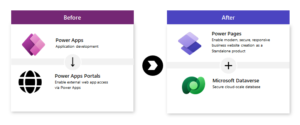
1) What are Microsoft Power Pages ?
In 2019, Microsoft introduced Power Apps Portals, a solution that allows companies to expose their database in a secure way to outside users. Now in 2022, Microsoft has announced that Power Apps Portals will be replaced with Microsoft Power Pages, a tool allowing businesses to build secure, low-code websites that are scalable and seamless.
Power Portals is an enterprise grade low-code SaaS (Software as a Service) platform that allows businesses to create, host, and administer rich, interactive, data-driven, business web apps across the globe. However, it was common knowledge in the Microsoft user community that the product lacked solution maturity, low-code features, and the ability to scale. For this reason, Microsoft has chosen to replace Power Apps Portals with Microsoft Power Pages.

A key difference is a new design studio that simplifies the process of building professional portals. Within the Pages workspace, designers have greater flexibility to design layouts and add components such as images, Power BI reports, tables and forms.
Using the Styling workspace, portal designers have greater control over the visual appearance. Modify each portal’s look to configure and publish business websites that are consistent with corporate branding, and potentially less need to create CSS.
2) How does Microsoft Power Pages work?
Power Pages allows users to create websites even when they are not professional developers. Once you create an account, you can decide to use a custom template or start with the default design template.
Some websites might require a database for adding, updating, or reading business information. For instance, you might have a page that collects information from customers. Fortunately, Power Pages comes with a data service known as Dataverse that works like a database. It stores information just like a normal database. It also comes with Microsoft Power automation, analysis, and security features.
3) Power Pages templates
The PowerPages designer includes templates for fully-featured websites with demo data to kick start portal projects. In the initial Power Pages release, the design studio includes starter templates to support scheduling, registrations, application submissions and progress tracking scenarios.
Five portal templates are currently available. Microsoft expects this to rapidly expand, covering additional repeatable processing scenarios that will enable organisations to deploy new sites and web apps quickly.
4) What makes Power Pages unique ?
Power Pages is connected to a full enterprise-grade hosting platform. One of the most prominent things Microsoft learned in the last few years through the organizations they work with, anything they use should be highly scalable, robust and flexible in controls-especially when working with branded external platforms. For this reason, Microsoft wanted to ensure that their next platform offer enterprise-grade website building with elastic scaling, high availability, authentication, authorization, and platform security built-in.
5) What else is new in Power Apps Portals ?
- Content Delivery Network
For portals with a global reach, Content Delivery Network integration can be enabled with a switch to optimize performance and provide consistent experiences. A CDN delivers static content to web visitors faster thanks to proximity and optimized connections. Power Pages stores the static portal contents such as images, buttons, style sheets and scripts on CDN servers to serve these to visitors from the nearest network location.
- Learning Hub
Power Pages has a dedicated home page featuring an integrated Learning Hub. Explore videos, documents and other resources that make creating the website you want easier.
- Responsive Rendering
Power Pages uses the Bootstrap user experience framework for fully responsive rendering without needing to write a line of code. Using QR codes, easily preview sites with a responsive layout running on a mobile device or desktop.
6) How do Power Pages work with other Power Platform components ?
Dataverse – Power Pages is powered by Dataverse to securely store and manage data enabling forms, views, dashboards and other familiar app components to surface Dataverse data.
Power Automate – flows can be connected to processes handled within Power Pages to interact with data and actions. This can include applying business logic or automating messages, for example sending appointment reminders.
Power BI – reports, dashboards, and tiles can be integrated, enabling portal users to access and interact with these visualisations.
Power Apps – data collected in any Power Apps, including Dynamics 365, can be surfaced within Power Pages.
Power Virtual Agents – Microsoft plans to add capabilities that will enable AI-driven chatbots for Power Pages.
